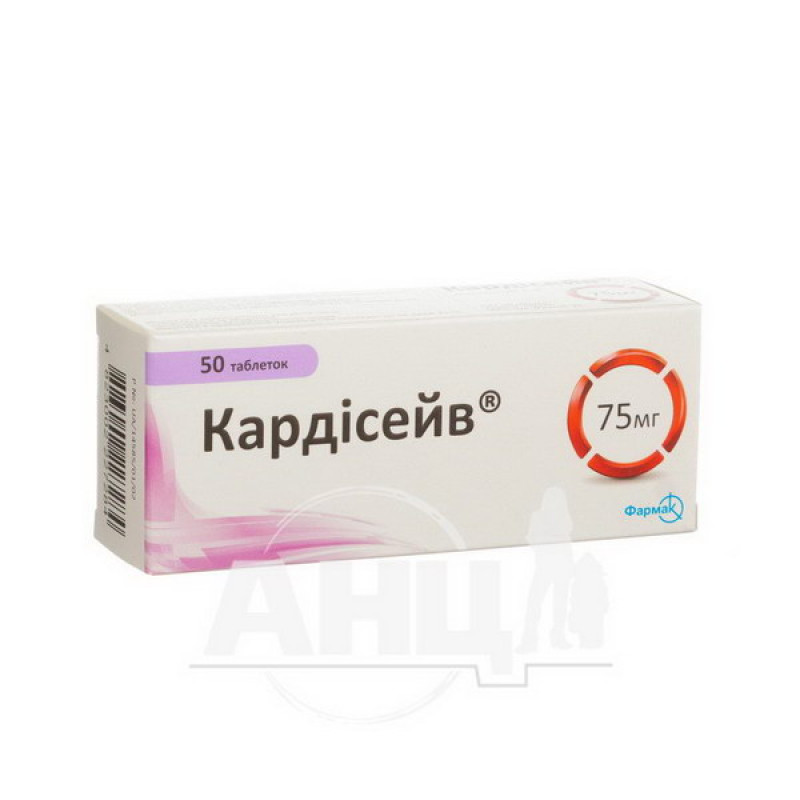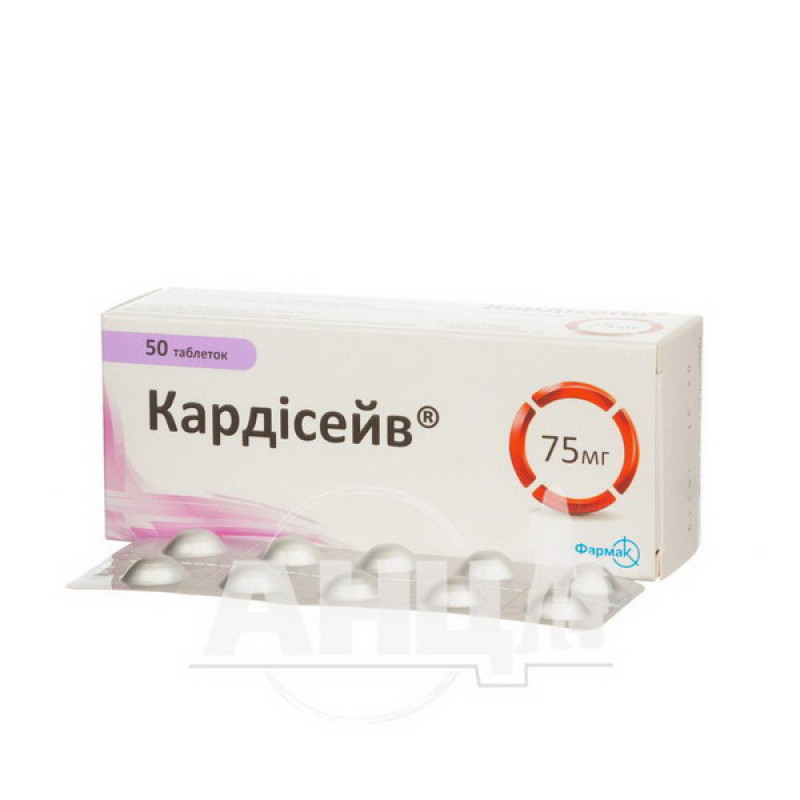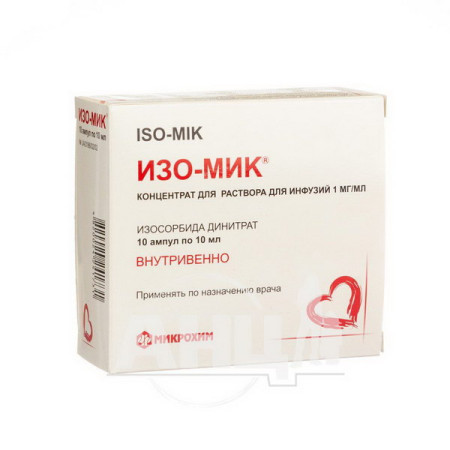Cardisave film-coated tablets 75 mg blister No. 50

Pharmacological properties
Pharmacodynamics. Acetylsalicylic acid is an analgesic, anti-inflammatory, antipyretic and antiplatelet agent.
The main pharmacological effect is inhibition of prostaglandin and thromboxane formation. The analgesic effect is an additional effect caused by inhibition of COX. The anti-inflammatory effect is associated with reduced blood flow caused by inhibition of PGE 2 synthesis.
Acetylsalicylic acid irreversibly inhibits the synthesis of prostaglandins G / H, its effect on prostaglandins lasts longer than acetylsalicylic acid is in the body. The effect of acetylsalicylic acid on the biosynthesis of thromboxane in platelets and on bleeding time continues for a long time after discontinuation of treatment. The effect ceases only after the appearance of new platelets in the blood plasma.
Magnesium hydroxide has an antacid effect and protects the mucous membrane of the digestive tract from the irritating effects of acetylsalicylic acid.
Pharmacokinetics. Absorption. After oral administration, acetylsalicylic acid is rapidly absorbed from the digestive tract. The rate of absorption decreases with food intake and in patients with migraine attacks, increases in patients with achlorhydria or in patients taking polysorbates or antacids. C max in serum is reached after 0.5-2 hours.
When taken orally, magnesium is slowly absorbed from the small intestine in small amounts.
Distribution. The binding of acetylsalicylic acid to plasma proteins is 80-90%. The volume of distribution in adults is 170 ml/kg body weight. Salicylates are highly bound to plasma proteins and are rapidly distributed throughout the body. Salicylates are excreted in breast milk and can cross the placental barrier. Magnesium is distributed in a protein-bound form (approximately 25-30%). A small amount is excreted in breast milk. Magnesium can cross the placental barrier.
Metabolism. Acetylsalicylic acid is hydrolyzed to the active metabolite - salicylate - in the stomach wall. After absorption, acetylsalicylic acid is rapidly converted to salicylic acid, but during the first 20 minutes after ingestion it is dominant in the blood plasma.
Excretion. Salicylate is mainly metabolized in the liver and excreted in the feces. T ½ is 2-3 hours. At high doses of acetylsalicylic acid, T ½ increases to 15-30 hours. Salicylate is also excreted unchanged in the urine. The volume excreted depends on the dose level and urine pH. Approximately 30% of the dose is excreted in the urine if the urine reaction is alkaline, and only 2% if it is acidic. A small amount of magnesium is excreted in the urine, but most of it is reabsorbed and excreted in the feces.
Indication
Acute (unstable angina, acute myocardial infarction) and chronic coronary artery disease; prevention of re-thrombosis; primary prevention of thrombosis, cardiovascular diseases, such as acute coronary syndrome, in patients over 50 years of age who have factors for the development of cardiovascular diseases: hypertension, hypercholesterolemia, diabetes mellitus, obesity (body mass index ≥30), hereditary history (myocardial infarction in at least one parent or sibling under the age of 55).
Application
Acute and chronic coronary artery disease. Recommended initial dose - 150 mg/day. Maintenance dose - 75 mg/day.
Acute myocardial infarction. Unstable angina. The recommended dose is 150-450 mg, administered as soon as possible after the onset of symptoms.
Prevention of recurrent thrombosis. The recommended initial dose is 150 mg/day. Maintenance dose is 75 mg/day.
Primary prevention of thrombosis, cardiovascular diseases, such as acute coronary syndrome, in patients with risk factors for cardiovascular disease. The recommended preventive dose is 75 mg/day.
The tablets are swallowed whole, if necessary washed down with water. If desired, the tablet can be broken in half, chewed or pre-crushed.
The doctor determines the course of treatment individually, depending on the indications and severity of the disease.
Contraindication
Hypersensitivity to the components of the drug, other salicylates; gastric ulcer in the acute phase; bleeding tendency (vitamin D deficiency, thrombocytopenia, hemophilia); severe liver failure, severe renal dysfunction (glomerular filtration rate 10 ml/min); severe heart failure; history of angioedema, Quincke's edema caused by the use of salicylates or nonsteroidal anti-inflammatory drugs.
Side effects
Adverse effects are classified by frequency of occurrence into the following categories: very common (≥1/10); common (≥1/100 to <1/10); uncommon (≥1/1,000 to <1/100); rare (≥1/10,000 to <1/1,000); very rare (≥1/10,000, including isolated cases).
Blood and lymphatic system disorders: very common - increased bleeding, inhibition of platelet aggregation; uncommon - occult bleeding; rare - anemia in case of prolonged therapy; very rare - hypoprothrombinemia (high doses), thrombocytopenia, neutropenia, aplastic anemia, eosinophilia, agranulocytosis;
Immune system disorders: infrequently - anaphylactic reactions, allergic rhinitis;
endocrine system disorders: rarely - hypoglycemia;
Nervous system disorders: often - headache, insomnia; infrequently - dizziness (vertigo), drowsiness; rarely - intracerebral hemorrhage;
Respiratory system disorders: often - bronchospasm (in patients with bronchial asthma);
Gastrointestinal disorders: very common - heartburn, reflux; common - erosive lesions of the upper digestive tract, nausea, dyspepsia, vomiting, diarrhea; uncommon - ulcers of the upper digestive tract, including vomiting with blood and loose stools; rare - gastrointestinal bleeding, perforation; very rare - stomatitis, esophagitis, toxic lesion with ulcers of the lower digestive tract, stricture, colitis, exacerbation of irritable bowel syndrome;
Liver disorders: rarely - increased levels of transaminases and LF in the blood serum; very rarely - dose-dependent reversible acute hepatitis of moderate severity;
Skin disorders: often - urticaria, rash of various nature, angioedema, purpura, hemorrhagic vasculitis, erythema multiforme, Stevens-Johnson syndrome, Lyell's syndrome.
Special instructions
The drug Cardisave is used with caution in cases such as:
Hypersensitivity to analgesics, anti-inflammatory, antirheumatic drugs, as well as in the presence of allergies to other substances; gastrointestinal ulcers, including chronic and recurrent ulcers or gastrointestinal bleeding in history; simultaneous use of anticoagulants; impaired renal function or cardiovascular circulation (for example, renal vascular pathology, congestive heart failure, hypovolemia, major surgery, sepsis or severe bleeding), since acetylsalicylic acid also increases the risk of impaired renal function and acute renal failure; severe glucose-6-phosphate dehydrogenase deficiency, since acetylsalicylic acid can cause hemolysis or hemolytic anemia in such patients, especially in the presence of risk factors (for example, use of the drug in high doses, fever or acute infectious process); impaired liver function.Ibuprofen may reduce the inhibitory effect of acetylsalicylic acid on platelet aggregation. In the case of using Cardisave, the patient should consult a doctor before starting to take ibuprofen as a painkiller.
Acetylsalicylic acid may cause bronchospasm or asthma attacks or other hypersensitivity reactions. Risk factors include a history of asthma, hay fever, nasal polyps or chronic respiratory disease, and a history of allergic reactions (e.g. skin reactions, itching, urticaria) to other substances.
Due to the inhibitory effect of acetylsalicylic acid on platelet aggregation, which persists for several days after administration, the use of drugs containing acetylsalicylic acid increases the risk of bleeding during surgery (including minor surgical interventions, such as tooth extraction).
When using acetylsalicylic acid in low doses, the excretion of uric acid may decrease. This may lead to an attack of gout in patients prone to it.
Do not use drugs containing acetylsalicylic acid in children and adolescents with acute respiratory viral infections, with or without fever, without consulting a doctor. With some viral diseases, especially influenza A, influenza B and chickenpox, there is a risk of developing Reye's syndrome - a very rare but life-threatening disease that requires urgent medical intervention. The risk may be increased if acetylsalicylic acid is used as a concomitant drug, but a causal relationship in this case has not been proven. If these conditions are accompanied by persistent vomiting, this may be a manifestation of Reye's syndrome.
Use during pregnancy and breastfeeding. The decision to use Cardisave in the I-II trimester of pregnancy and during breastfeeding should be made after a careful assessment of the benefit/risk ratio. The drug in such cases is used in the lowest possible doses (up to 100 mg/day) and under close supervision. The duration of use is as short as possible.
The drug is contraindicated for use in the third trimester of pregnancy.
Children: The drug should not be used in children.
The ability to influence the reaction rate when driving vehicles or working with other mechanisms. Does not affect.
Interactions
Contraindications to simultaneous use
Methotrexate. The use of acetylsalicylic acid and methotrexate in doses of 15 mg/week or more increases the hematological toxicity of methotrexate (reduction in renal clearance of methotrexate by anti-inflammatory agents and displacement of methotrexate from plasma protein binding by salicylates).
ACE inhibitors. ACE inhibitors in combination with high doses of acetylsalicylic acid cause a decrease in filtration due to inhibition of the vasodilator effect of prostaglandins and a decrease in the antihypertensive effect.
Probenecid, sulfinpyrazone. When using probenecid and high doses of salicylates (500 mg), the metabolism of both drugs is inhibited, and uric acid excretion may also decrease.
Combinations to be used with caution
Methotrexate. When using acetylsalicylic acid and methotrexate at doses of 15 mg/week, the hematological toxicity of methotrexate increases (reduction in renal clearance of methotrexate by anti-inflammatory agents and displacement of methotrexate from plasma protein binding by salicylates).
Clopidogrel, ticlopidine. The combined use of clopidogrel and acetylsalicylic acid has a synergistic effect. Such combined use should be carried out with caution, as it increases the risk of bleeding.
Anticoagulants (warfarin, phenprocoumon). Thrombin production may be reduced, resulting in an indirect effect on platelet activity (vitamin K antagonist) and an increased risk of bleeding.
Abciximab, tirofiban, eptifibatide. Inhibition of glycoprotein IIb/IIIa receptors on platelets is possible, which leads to an increased risk of bleeding.
Heparin: May reduce thrombin production, resulting in an indirect effect on platelet activity, leading to an increased risk of bleeding.
If two or more of the above substances are used together with acetylsalicylic acid, this may lead to a synergistic effect of increased inhibition of platelet activity and, as a result, increased hemorrhagic diathesis.
NSAIDs and COX-2 inhibitors (celecoxib). Concomitant use increases the risk of gastrointestinal disorders, which may lead to gastrointestinal bleeding.
Ibuprofen. Concomitant use of ibuprofen inhibits irreversible platelet aggregation induced by acetylsalicylic acid. Treatment of patients with increased cardiovascular risk with ibuprofen may limit the cardioprotective effect of acetylsalicylic acid. Patients taking acetylsalicylic acid once daily for cardiovascular disease prevention and occasionally using ibuprofen should take acetylsalicylic acid at least 2 hours before taking ibuprofen.
Furosemide: Inhibition of proximal tubular elimination of furosemide is possible, leading to a decrease in the diuretic effect of furosemide.
Quinidine: May have an additive effect on platelets, leading to increased bleeding time.
Spironolactone: Possible modified renin effect, leading to reduced efficacy of spironolactone.
Selective serotonin reuptake inhibitors: Concomitant use increases the risk of gastrointestinal disorders, which may lead to gastrointestinal bleeding.
Valproate. When used simultaneously with valproate, acetylsalicylic acid displaces it from its association with blood plasma proteins, increasing the toxicity of the latter (central nervous system depression, gastrointestinal disorders).
Systemic glucocorticosteroids (with the exception of hydrocortisone, which is used for replacement therapy in Addison's disease) reduce the level of salicylates in the blood and increase the risk of overdose after the end of treatment.
Antidiabetic drugs. Concomitant use of acetylsalicylic acid and antidiabetic drugs increases the risk of hypoglycemia.
Antacids. Possible increase in renal clearance and decrease in renal absorption (due to increased urine pH), which leads to a decrease in the effect of acetylsalicylic acid.
Varicella vaccine. Concomitant use increases the risk of Reye's syndrome.
Ginkgo biloba. Concomitant use with ginkgo biloba inhibits platelet aggregation, leading to an increased risk of bleeding.
Digoxin. When used simultaneously with digoxin, the concentration of the latter in the blood plasma increases due to a decrease in renal excretion.
Alcohol damages the gastrointestinal mucosa and prolongs bleeding time due to the synergism of acetylsalicylic acid and alcohol.
Overdose
The dangerous dose for adults is 150 mg/kg of body weight.
Symptoms of chronic moderate poisoning (resulting from prolonged use of high doses of the drug): dizziness, ringing in the ears, deafness, vasodilation, sweating, nausea, vomiting, headache, impaired consciousness.
Symptoms of severe and acute poisoning (due to overdose): hyperventilation of the lungs, fever, restlessness, ketosis, respiratory alkalosis and metabolic acidosis.
In severe poisoning, central nervous system depression can lead to coma, cardiovascular collapse, and respiratory arrest.
Acute poisoning with acetylsalicylic acid (300 mg/kg) often causes acute respiratory distress syndrome, and a dose of 500 mg/kg can be fatal.
Treatment: In case of acute overdose, gastric lavage and administration of activated charcoal are necessary.
Fluid and electrolyte balance should be restored to avoid acidosis, hyperpyrexia, hyperkalemia, and dehydration. Effective methods for removing salicylate from plasma include alkaline diuresis, hemodialysis, or hemoperfusion.
Storage conditions
In the original packaging at a temperature not exceeding 25 °C.
There are no reviews for this product.
There are no reviews for this product, be the first to leave your review.
No questions about this product, be the first and ask your question.







